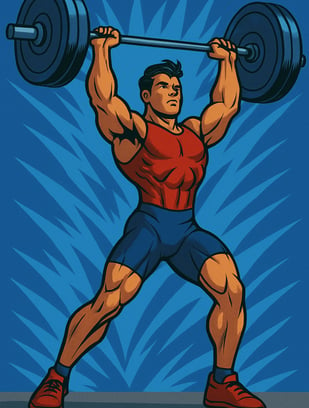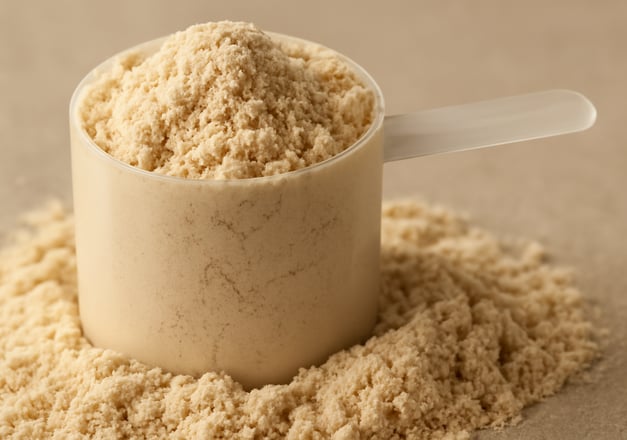Protein Myths Busted: What You Really Need to Know
Protein is celebrated as the cornerstone of fitness, muscle growth, and overall health. Yet, despite its popularity, protein remains misunderstood. Myths and misinformation frequently cloud our nutritional choices, potentially hindering fitness goals and overall wellness. Let's unpack the truth about protein and dispel some common misconceptions.
PROTEIN
5/13/20256 min read
Myth #1: More Protein Means More Muscle
MYTH:
Eating extra protein automatically builds bigger muscles.
TRUTH:
Protein is essential for muscle repair and growth, but real muscle gains come from consistent resistance training paired with proper nutrition. Extra protein beyond your body's needs just adds calories and may lead to fat gain, not more muscle.
Myth #2: Protein Supplements Are Better Than Whole Foods
MYTH:
Protein powders and bars are superior to real food.
TRUTH:
Supplements are convenient, but whole foods like eggs, chicken, fish, beans, and legumes offer fiber, vitamins, and minerals that most supplements lack. Supplements should support, not replace, a healthy diet.
Myth #3: High-Protein Diets Damage Your Kidneys
MYTH:
Eating a lot of protein is bad for your kidneys.
TRUTH:
For healthy people, high-protein diets are safe. Contrary to popular belief, there is no strong evidence that a high protein intake harms kidney function in people without existing kidney disease. However, people with pre-existing kidney conditions may need to limit protein to avoid placing additional strain on their kidneys. In such cases, it’s important to work closely with a healthcare provider or dietitian to tailor protein intake to their specific needs. But for most healthy adults, eating more protein — even above the standard recommended daily allowance — is not only safe, but often beneficial.
Myth #4: Protein is Only for Athletes and Bodybuilders
MYTH:
Only athletes and gym-goers need lots of protein.
TRUTH:
Protein is critical for everyone, but especially for bodybuilders and athletes. While athletes may need more protein due to increased physical demands, all bodies require protein daily for basic functioning — even if you're not hitting the gym. Without enough protein, athletes may experience slower recovery, decreased performance, and even muscle loss. That’s why a higher protein intake is crucial for supporting muscle repair, promoting lean muscle gains, and optimizing athletic performance.
Myth #5: You Have to Eat Protein Immediately After a Workout
MYTH:
Miss the 30-minute window and your workout is wasted.
TRUTH:
While eating after a workout is beneficial, the total amount of protein you consume daily is what really matters most. You don’t need to panic if you don’t eat immediately after training.
Myth #6:The More Expensive the Protein Powder, The better
MYTH:
Higher price = better quality protein.
TRUTH:
Many affordable protein powders offer excellent quality without the premium price tag. Don’t be fooled into thinking you need to spend a fortune for effective results — what matters most is what’s in the scoop. Look for products with clear ingredient labels, minimal fillers or artificial additives, and at least 20 grams of protein per serving. Focus on ingredient transparency, third-party testing, and protein content per scoop, not just the brand name or price.
Myth #7: You Can Only Absorb 30 Grams of Protein at a Time
MYTH:
Your body can't handle more than 30 grams of protein in one meal.
Truth: Your body can absorb much more than 20–40 grams of protein per meal — and it absolutely puts it to use. While muscle protein synthesis (MPS) — the process of building new muscle — may max out around 20–40 grams in a single meal, that doesn't mean anything above that is wasted. Protein has many roles beyond muscle growth. Any excess is used to support a wide range of critical functions, such as:
Immune system function (creating antibodies and immune cells)
Hormone and enzyme production
Tissue repair (including organs, skin, and hair)
Nutrient transport (via protein-based molecules like hemoglobin)
Additionally, some amino acids may be stored temporarily or converted to energy if needed. The myth that your body “can’t absorb more than 30 grams” is based on a misunderstanding of how the body uses protein, not how it absorbs it. The truth is: your body absorbs nearly all the protein you eat — it just prioritizes different uses depending on your needs.
Myth #8: You Don’t Need Extra Protein as You Get Older
MYTH:
Older adults don’t need to prioritize protein.
TRUTH:
Aging increases the need for higher protein intake to preserve muscle mass, bone strength, and overall function. Adults over 50 often benefit from 1.0 to 1.2 grams per kilogram of body weight per day.
At the end of the day, protein isn’t just for bodybuilders — it’s something everyone needs to feel and perform their best. When used wisely, it can help you feel stronger, recover faster, and perform better in daily life. Whether you’re trying to build muscle, stay full longer, or just support your overall health, getting enough protein matters. And protein powder? It’s just a simple, convenient way to help you hit your goals. Just focus on quality ingredients, smart choices, and what works for you. Your body will thank you for it.




Myth #1: More Protein Means More Muscle
MYTH:
Eating extra protein automatically builds bigger muscles.
TRUTH:
Protein is essential for muscle repair and growth, but real muscle gains come from consistent resistance training paired with proper nutrition. Extra protein beyond your body's needs just adds calories and may lead to fat gain, not more muscle.
Myth #2: Protein Supplements Are Better Than Whole Foods
MYTH:
Protein powders and bars are superior to real food.
TRUTH:
Supplements are convenient, but whole foods like eggs, chicken, fish, beans, and legumes offer fiber, vitamins, and minerals that most supplements lack. Supplements should support, not replace, a healthy diet.
Myth #3: High-Protein Diets Damage Your Kidneys
MYTH:
Eating a lot of protein is bad for your kidneys.
TRUTH:
For healthy people, high-protein diets are safe. Contrary to popular belief, there is no strong evidence that a high protein intake harms kidney function in people without existing kidney disease. However, people with pre-existing kidney conditions may need to limit protein to avoid placing additional strain on their kidneys. In such cases, it’s important to work closely with a healthcare provider or dietitian to tailor protein intake to their specific needs. But for most healthy adults, eating more protein — even above the standard recommended daily allowance — is not only safe, but often beneficial.
Myth #4: Protein is Only for Athletes and Bodybuilders
MYTH:
Only athletes and gym-goers need lots of protein.
TRUTH:
Protein is critical for everyone, but especially for bodybuilders and athletes. While athletes may need more protein due to increased physical demands, all bodies require protein daily for basic functioning — even if you're not hitting the gym. Without enough protein, athletes may experience slower recovery, decreased performance, and even muscle loss. That’s why a higher protein intake is crucial for supporting muscle repair, promoting lean muscle gains, and optimizing athletic performance.
Myth #5: You Have to Eat Protein Immediately After a Workout
MYTH:
Miss the 30-minute window and your workout is wasted.
TRUTH:
While eating after a workout is beneficial, the total amount of protein you consume daily is what really matters most. You don’t need to panic if you don’t eat immediately after training.
Myth #6:The More Expensive the Protein Powder, The better
MYTH:
Higher price = better quality protein.
TRUTH:
Many affordable protein powders offer excellent quality without the premium price tag. Don’t be fooled into thinking you need to spend a fortune for effective results — what matters most is what’s in the scoop. Look for products with clear ingredient labels, minimal fillers or artificial additives, and at least 20 grams of protein per serving. Focus on ingredient transparency, third-party testing, and protein content per scoop, not just the brand name or price.
Myth #7: You Can Only Absorb 30 Grams of Protein at a Time
MYTH:
Your body can't handle more than 30 grams of protein in one meal.
Truth: Your body can absorb much more than 20–40 grams of protein per meal — and it absolutely puts it to use. While muscle protein synthesis (MPS) — the process of building new muscle — may max out around 20–40 grams in a single meal, that doesn't mean anything above that is wasted. Protein has many roles beyond muscle growth. Any excess is used to support a wide range of critical functions, such as:
Immune system function (creating antibodies and immune cells)
Hormone and enzyme production
Tissue repair (including organs, skin, and hair)
Nutrient transport (via protein-based molecules like hemoglobin)
Additionally, some amino acids may be stored temporarily or converted to energy if needed. The myth that your body “can’t absorb more than 30 grams” is based on a misunderstanding of how the body uses protein, not how it absorbs it. The truth is: your body absorbs nearly all the protein you eat — it just prioritizes different uses depending on your needs.
Myth #8: You Don’t Need Extra Protein as You Get Older
MYTH:
Older adults don’t need to prioritize protein.
TRUTH:
Aging increases the need for higher protein intake to preserve muscle mass, bone strength, and overall function. Adults over 50 often benefit from 1.0 to 1.2 grams per kilogram of body weight per day.
At the end of the day, protein isn’t just for bodybuilders — it’s something everyone needs to feel and perform their best. When used wisely, it can help you feel stronger, recover faster, and perform better in daily life. Whether you’re trying to build muscle, stay full longer, or just support your overall health, getting enough protein matters. And protein powder? It’s just a simple, convenient way to help you hit your goals. Just focus on quality ingredients, smart choices, and what works for you. Your body will thank you for it.




© 2025. All rights reserved.
